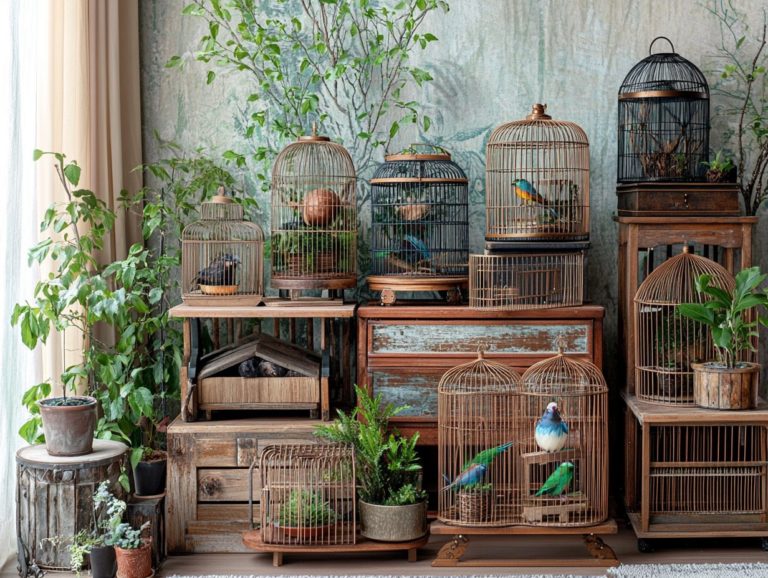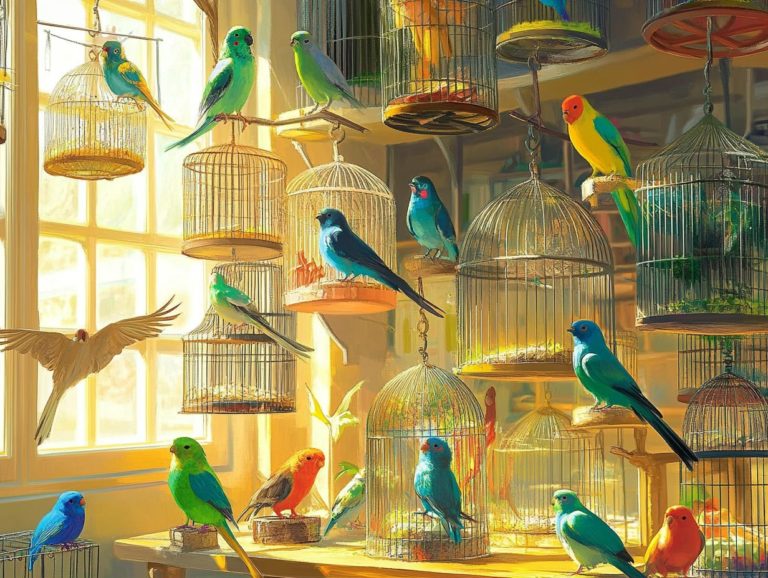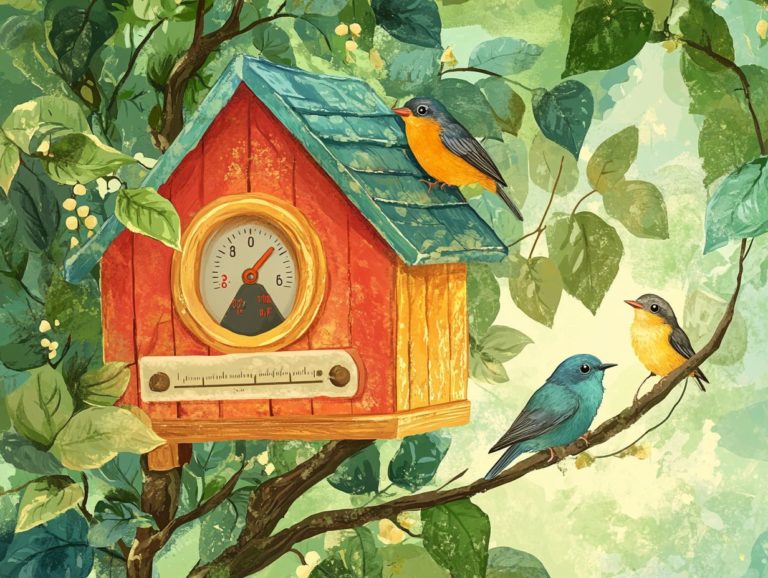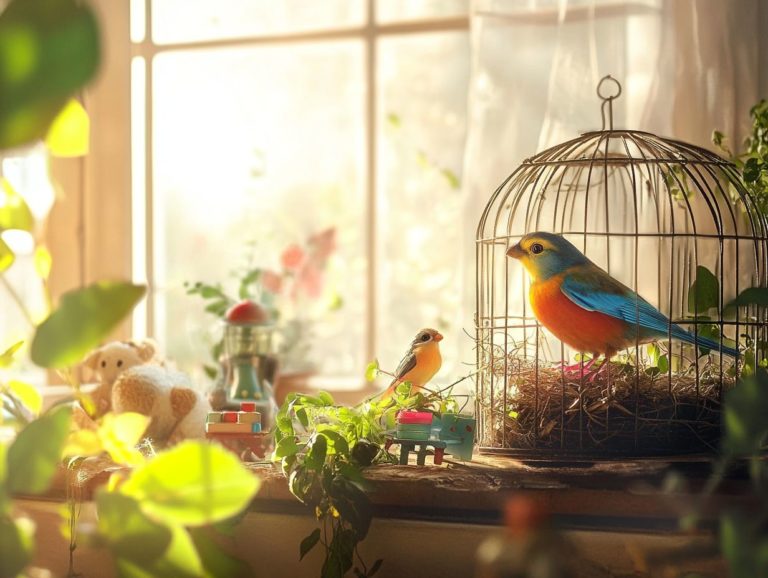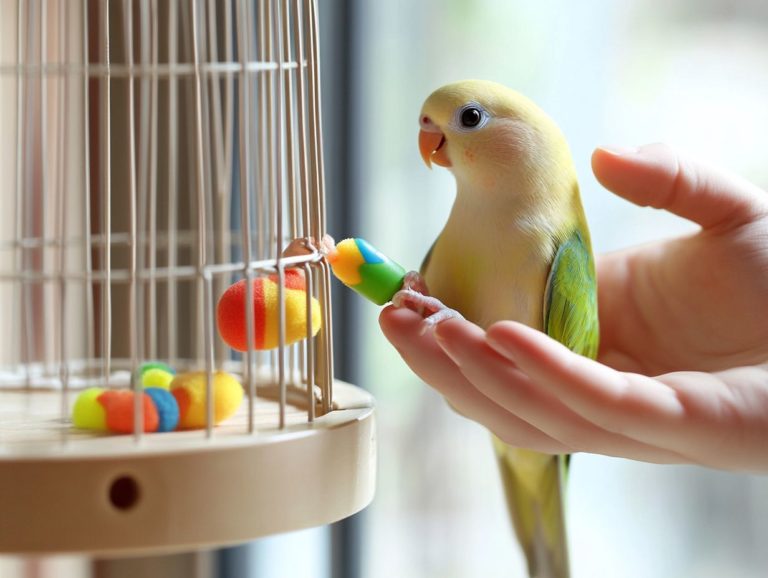Top 10 Indoor Cage Plants Toxic to Birds
If you re a bird owner who loves plants, selecting your indoor greenery with care is essential. While many houseplants can brighten your space, some can be surprisingly toxic to your feathered friends. This article highlights the top 10 indoor cage plants that pose a risk to birds, including popular varieties like Philodendron and Aloe Vera.
You ll also learn about plant poisoning symptoms, what to do if your bird ingests something harmful, and safe alternatives that can thrive in your home. With the right choices, you can keep your pet healthy while maintaining a beautiful living space!
Contents
- Key Takeaways:
- 1. Philodendron
- 2. Dieffenbachia
- 3. Pothos
- 4. English Ivy
- 5. Sago Palm
- 6. Aloe Vera
- 7. Snake Plant
- 8. ZZ Plant
- 9. Jade Plant
- 10. Peace Lily
- Why Are These Plants Toxic to Birds?
- Frequently Asked Questions
- 1. Which indoor cage plants are considered toxic to birds?
- 2. How do these toxic plants affect birds?
- 3. Are there safe alternatives to toxic plants?
- 4. Can birds be affected by toxic plants without eating them?
- 5. How can I keep my bird away from toxic plants?
- 6. What should I do if my bird eats a toxic plant?
Key Takeaways:
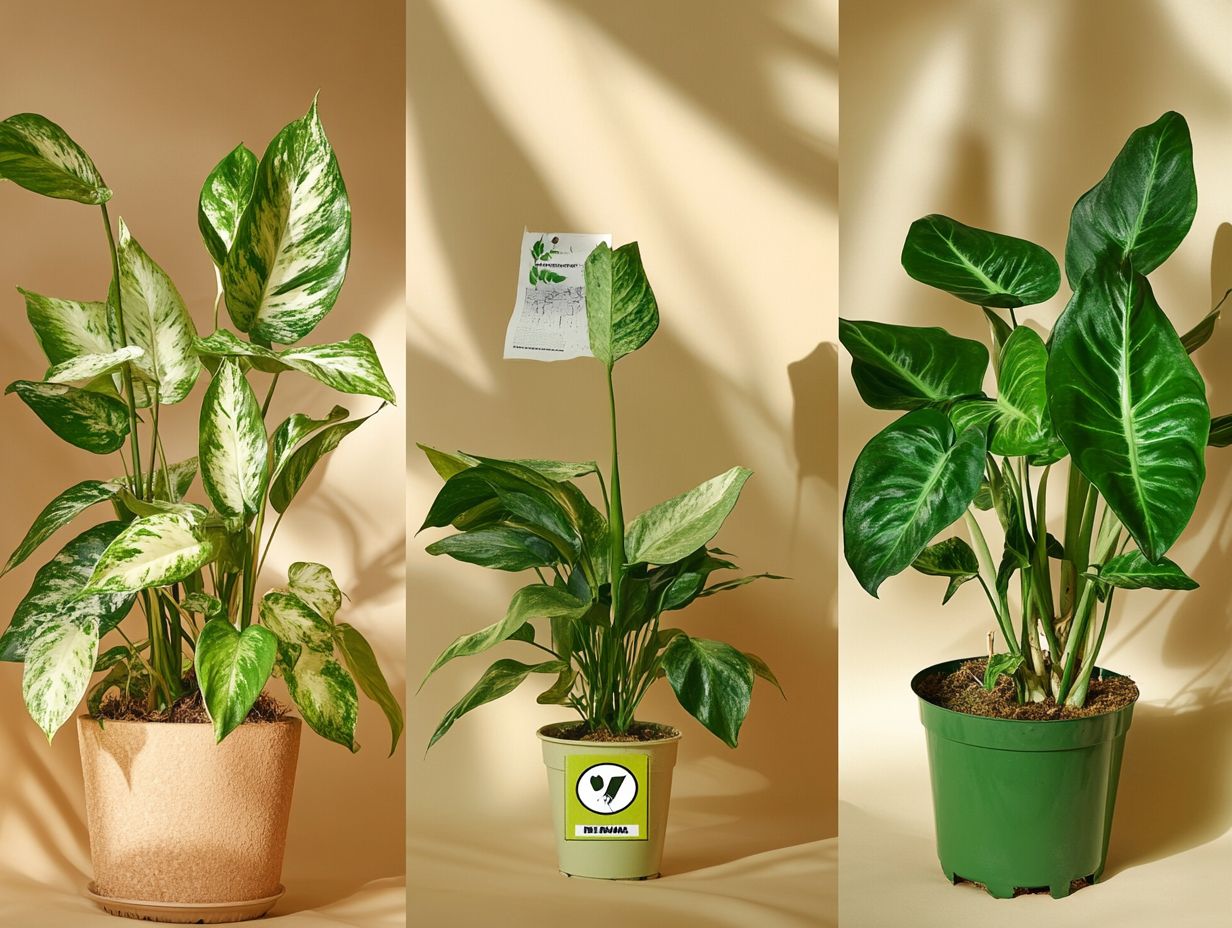
- Keep Philodendron, Dieffenbachia, Pothos, English Ivy, Sago Palm, Aloe Vera, Snake Plant, ZZ Plant, Jade Plant, and Peace Lily away from your birds to prevent poisoning.
- Symptoms of plant poisoning in birds include vomiting, diarrhea, seizures, and difficulty breathing.
- If your bird has ingested a toxic plant, seek immediate veterinary care and bring a sample of the plant for identification.
1. Philodendron
The Philodendron is a beloved houseplant known for its lush foliage and low maintenance needs. However, it is toxic to birds, making plant safety a crucial consideration for pet owners and bird enthusiasts.
Popular varieties like the Heartleaf Philodendron and Velvet Philodendron are admired for their beauty and resilience. To help these plants thrive, provide them with indirect light and water them only when the top inch of soil feels dry.
These plants contain small crystals that can harm birds if consumed, leading to serious health problems, including drooling, vomiting, or difficulty breathing. Protect your avian companions by consulting a Certified Avian Vet for advice on safe alternatives.
2. Dieffenbachia
Dieffenbachia, often called dumb cane, is a stunning indoor plant, but it poses risks for birds due to its toxic properties. If ingested, this plant can lead to severe complications.
Its leaves contain small crystals that can cause irritation and swelling in a bird’s mouth, throat, and gastrointestinal tract. You may notice symptoms like difficulty swallowing, drooling, and vomiting in affected birds.
As a bird owner, stay vigilant about the plants you bring into your home. Instead of Dieffenbachia, consider safer alternatives such as:
- Spider plants
- Bamboo palms
These options not only beautify your space but also create a healthier environment for your feathered companions.
3. Pothos
Pothos is a favorite among indoor plant enthusiasts due to its resilience and charming vines. However, it is toxic to birds, highlighting the need to choose bird cage plants carefully.
This lush tropical beauty features heart-shaped leaves and thrives in low-light situations, adding vibrancy to any home. Many appreciate its air-purifying abilities, but if your birds ingest Pothos, they could face issues like vomiting and oral irritation.
Instead, consider safer alternatives such as:
- Spider plants
- Bamboo palm
Both options are safe for your avian companions and will elevate the aesthetic of your interior environment.
In conclusion, being aware of the hazards posed by certain indoor plants can help you prevent unfortunate incidents and promote the well-being of your feathered friends. Act now to protect your pets by choosing safe plants for a healthy, beautiful home!
4. English Ivy
English Ivy is admired for its decorative charm, but it can also pose risks to birds. Understanding plant species and their potential impact on avian health is essential to avoid serious issues.
This climbing vine thrives in many places, making it a popular choice for indoor plants! It prefers well-drained soil and indirect sunlight. However, as a bird owner, you must exercise caution. Ingesting English Ivy can cause unpleasant symptoms such as vomiting or diarrhea in your feathered companions.
To enjoy greenery without endangering your avian friends, consider alternatives like spider plants or parlor palms. These non-toxic options bring vibrant life into your home and ensure a safe environment for your birds, allowing aesthetics and health to coexist in perfect harmony.
5. Sago Palm
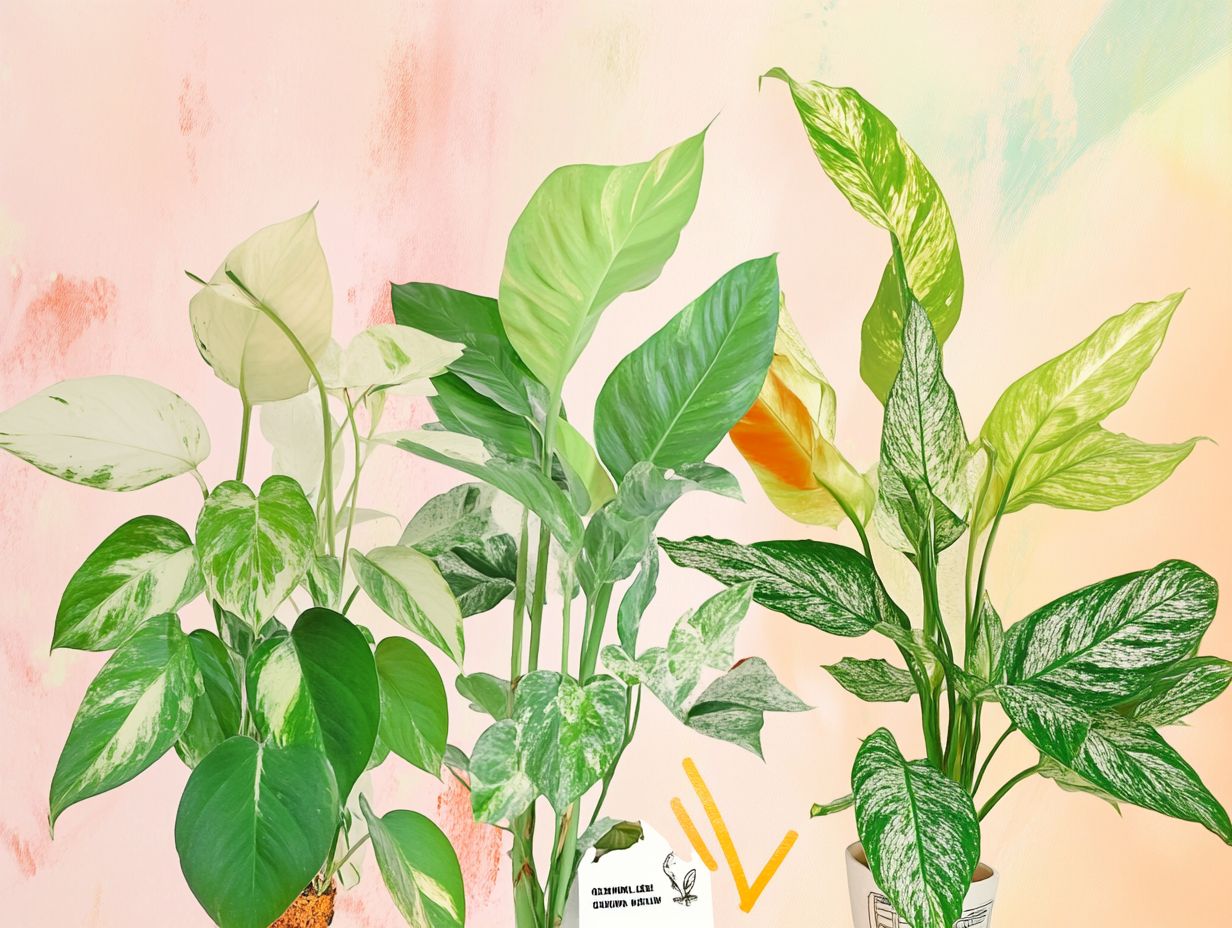
The Sago Palm may catch your eye with its exotic allure, but it can be very harmful, especially to birds. This highlights the importance of understanding plant safety and the associated risks.
This popular ornamental plant contains toxins like cycasin, which can wreak havoc on avian health. If your feathered friends show signs of toxicity, like vomiting, lethargy, or even liver failure, act quickly! These symptoms indicate serious consequences from exposure.
To protect your beloved birds, explore safer alternatives like spider plants or parlor palms. By raising awareness about the dangers of the Sago Palm, you can help create safer gardens that remain welcoming sanctuaries for our feathered friends.
6. Aloe Vera
Aloe Vera is a well-known succulent celebrated for its healing properties. However, it s crucial to know that it s not safe for birds. This plant is considered toxic and can lead to serious health issues if ingested in large amounts.
While many people enjoy its soothing gel for skin ailments and digestive troubles, your avian companions should avoid it to prevent potential toxicity. If your bird has consumed any part of this plant, watch for signs of distress, which may include lethargy and digestive issues.
Instead, consider exploring safer, non-toxic alternatives such as:
- Spider Plants
- Boston Ferns
- Parlor Palms
These plants enhance your home s aesthetic and purify the air, all without posing health risks to your feathered friends.
7. Snake Plant
The Snake Plant, known for its air-purifying prowess, is another toxic contender that can pose health risks for birds. As a bird owner, it s vital to consider indoor plant safety when choosing greenery for your home.
This resilient succulent features striking, sword-like leaves that beautify any indoor space. However, you must be aware of the potential dangers. While its ability to filter indoor air pollutants is impressive, the saponins it contains chemicals that can be harmful to birds can endanger your avian friends if ingested.
To keep your feathered companions safe, consider opting for safer alternatives like:
- Spider plants
- Boston ferns
These options provide similar air-purifying benefits while posing minimal risk to your birds. By educating yourself on plant selection, you can create a harmonious living space for both your pets and yourself.
8. ZZ Plant
The ZZ Plant, renowned for its durability and striking appearance, is also recognized as a toxic plant that can pose health risks to your birds. This underscores the importance of proper plant identification and awareness for pet owners.
This resilient houseplant thrives in low-light conditions and requires minimal watering, making it a favored choice for indoor spaces. However, despite its low-maintenance appeal, its sap and foliage contain compounds that can be harmful to your birds. For bird owners, understanding which plants may pose risks is essential for creating a safe environment.
Discover safe and beautiful non-toxic alternatives that will brighten your home, such as:
- Spider plants
- Bamboo palm
These options not only enhance your space s beauty but also ensure the safety of your feathered friends. By staying informed and vigilant, you can cultivate a harmonious home that beautifully balances aesthetics with the well-being of your pets.
9. Jade Plant
The Jade Plant, often celebrated for its association with good luck and prosperity, is unfortunately toxic to birds. It s crucial for you to remain vigilant, as consumption of this plant can lead to serious health issues for your avian companions.
While many appreciate its aesthetic charm and low maintenance requirements, it s essential to understand the risks this plant poses, particularly to sensitive bird species. Symptoms of poisoning can manifest as lethargy, vomiting, and a diminished appetite, creating a worrisome situation for those who hold their feathered friends dear.
To cultivate a safer environment, consider opting for these options:
- Spider plants
- Bamboo palms
- Boston ferns
These choices not only enhance your home s greenery but also safeguard the well-being of your pet birds. By incorporating these options, you ensure that your living space remains both beautiful and inviting for every member of your household.
10. Peace Lily
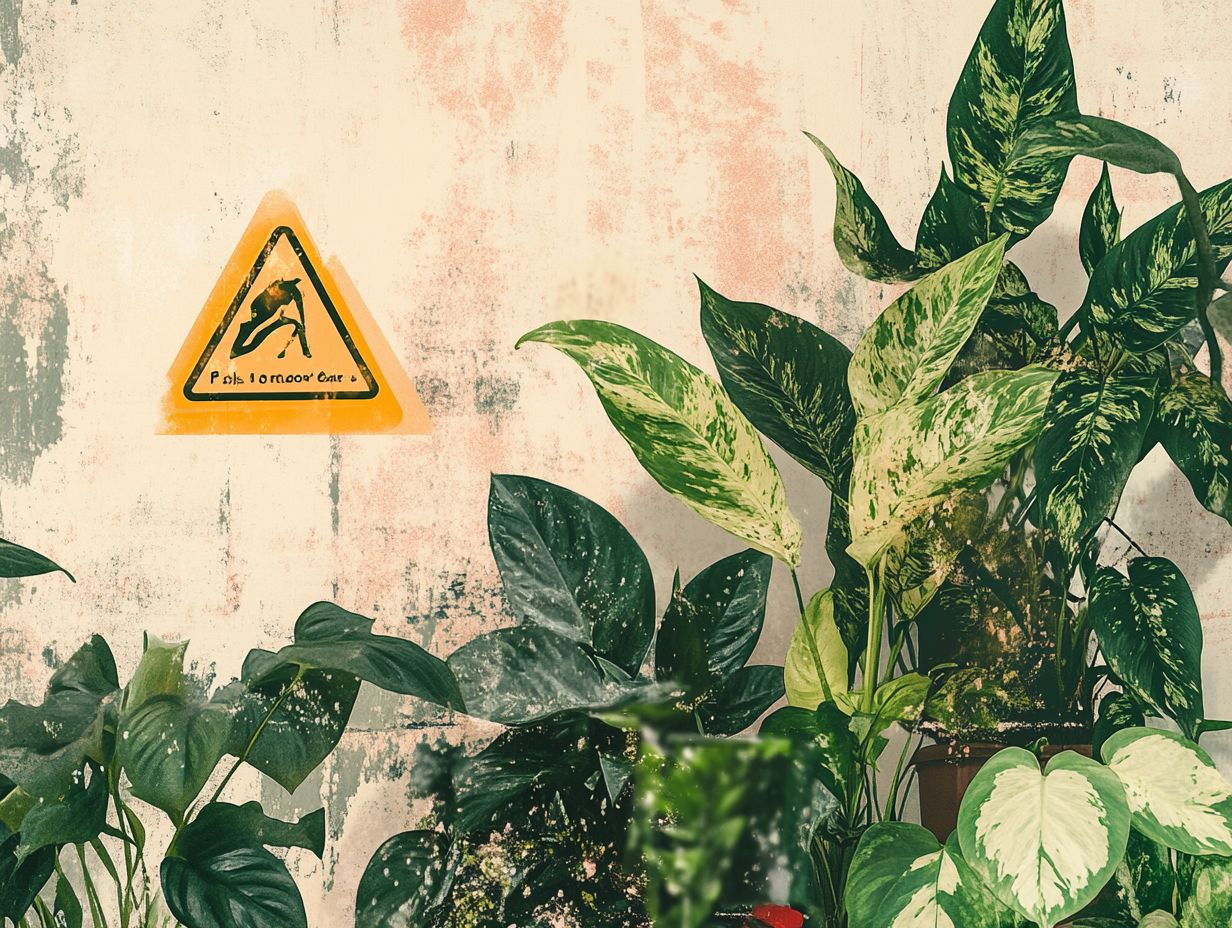
The Peace Lily may catch your eye with its stunning appearance, but it s crucial to be aware that this indoor plant is toxic to birds. This highlights the importance of plant safety, especially for bird owners who need to choose non-toxic alternatives.
If ingested, the Peace Lily can lead to a range of unpleasant symptoms in birds, such as vomiting, difficulty breathing, and swelling of the mouth. That s why it s essential to keep these plants out of reach, ensuring the safety of your birds.
Consider exploring alternative plants that not only elevate your home s aesthetic but also prioritize the health of your feathered friends. Non-toxic options like:
- Spider plants
- Boston ferns
- Parlor palms
These are excellent choices that offer lush greenery without the worry of toxicity. By opting for these safer varieties, you can cultivate a vibrant and harmonious living space that benefits both you and your birds.
Why Are These Plants Toxic to Birds?
Understanding why certain plants can be toxic to birds involves looking into their chemical composition and identifying the specific compounds that contribute to avian toxicology. These compounds can lead to serious health issues when ingested.
You ll find that common toxic compounds include natural chemicals, glycosides, and oxalates, each having a distinct impact on avian physiology. For instance, these natural chemicals can disrupt the nervous system, resulting in symptoms like tremors or seizures. Glycosides, on the other hand, may jeopardize cardiac health, potentially causing arrhythmias or even sudden death. Oxalates pose a risk by hindering calcium absorption, which is essential for maintaining strong bones.
Given these potential dangers, it s crucial for bird owners to create an environment that prioritizes plant safety. This means selecting non-toxic varieties and being vigilant about recognizing potential hazards, ultimately promoting the health and well-being of their cherished feathered companions.
Explore these safer plants today and create a beautiful, bird-friendly home!
What Are the Symptoms of Plant Poisoning in Birds?
Plant poisoning in birds can present a range of concerning symptoms, such as lethargy and vomiting. It’s essential for you as a bird owner to recognize these signs early and seek the expertise of a Certified Avian Vet a veterinarian specializing in bird care for prompt treatment.
Your bird may also experience behavioral changes, struggle with breathing, experience tremors, suffer from diarrhea, or lose their appetite. These symptoms can escalate rapidly if not addressed. Staying vigilant is key; even the slightest shift in your pet’s daily habits could signal a serious health issue.
The expertise of a Certified Avian Vet is invaluable in these situations. These specialists possess the training necessary to accurately diagnose the underlying causes of these troubling symptoms and provide crucial treatment, helping your avian companion return to health swiftly. Remember, early intervention can significantly enhance the chances of recovery and promote overall well-being.
What Should You Do If Your Bird Has Ingested a Toxic Plant?
If your bird has ingested a toxic plant, immediate action is critical to preventing serious health issues. Act quickly: contact a Certified Avian Vet right away to ensure your feathered friend receives the necessary care.
Pay close attention to your bird for any unusual symptoms, like vomiting, lethargy, or difficulty breathing these signs could indicate serious complications. Documenting any changes in behavior or physical condition will be invaluable when consulting with the vet. Be prepared to provide specific details about the plant ingested, including its type and the amount consumed, if known.
Taking proactive measures, such as educating yourself about toxic plants, can greatly reduce risks and help you create a safer environment for these delicate creatures.
How Can You Prevent Your Bird from Coming into Contact with These Plants?
Preventing your bird from coming into contact with toxic plants requires a proactive approach. Start by educating yourself about harmful species and ensuring that your indoor plant selection is safe by either removing or securely placing these plants out of reach.
Identifying potential threats is just the beginning; regularly assess your living environment. Consider implementing strategies such as using plant stands or shelves designed to elevate greenery safely above your bird s reach.
Informing family members about the dangers posed by certain plants can create a united front in maintaining a safe haven for your feathered friend. Establishing clear guidelines for plant care and supervision, especially when children are present, enhances this safety net and ensures that everyone is on the same page regarding the importance of these preventive measures.
What Are Some Safe Alternatives for Indoor Plants?
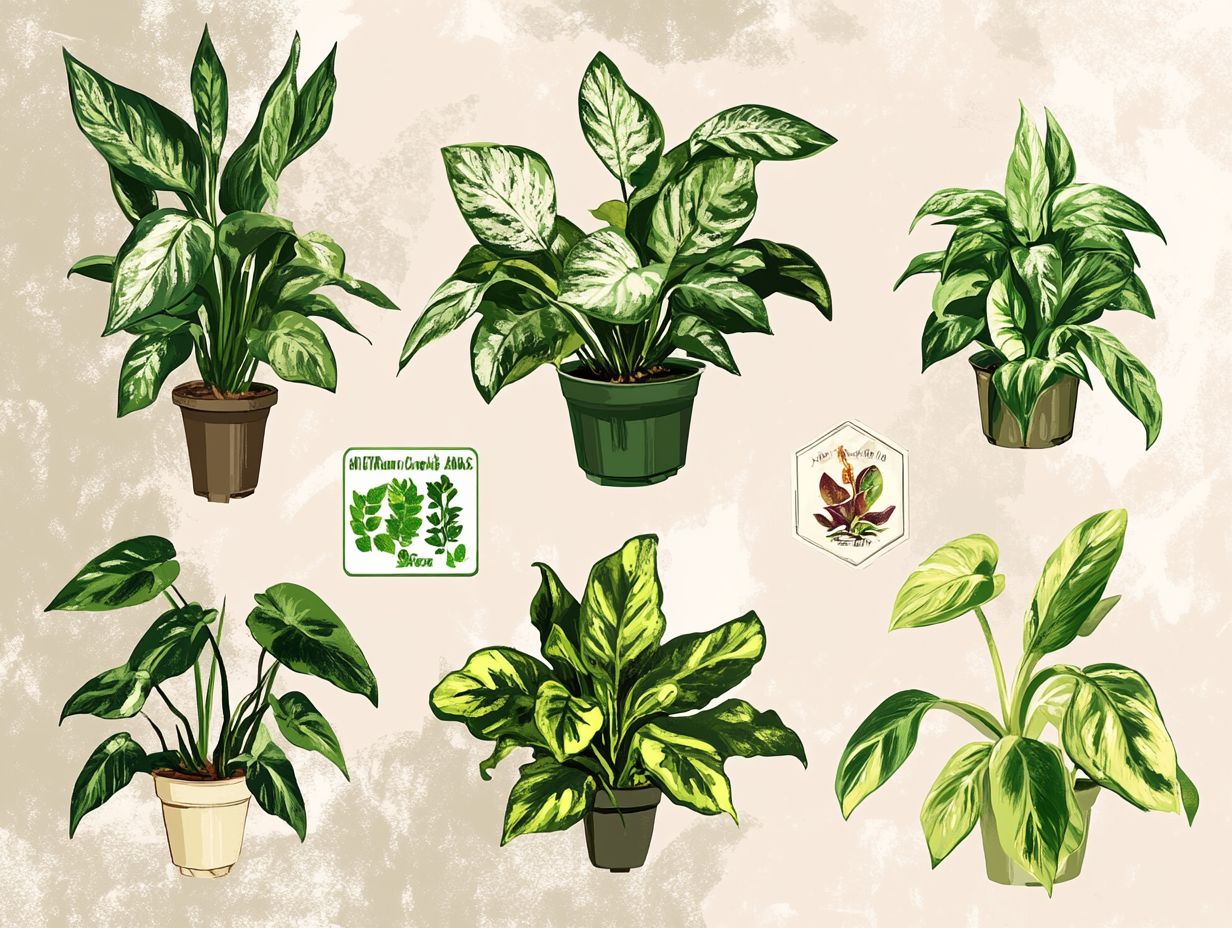
Finding safe alternatives for indoor plants is vital for bird owners. You can choose from a variety of non-toxic plants that bring beauty to your space without endangering your feathered companions, creating a harmonious living environment.
By cultivating bird-safe greenery, you not only enhance the aesthetic appeal of your home but also contribute positively to the health and well-being of your avian friends. It’s essential to familiarize yourself with various safe plant options.
Consider spider plants and Boston ferns, known for their air-purifying qualities while remaining non-toxic.
Incorporating herbs like basil and parsley, along with vegetables such as carrots and bell peppers, into their diet adds both nutrition and delight. Ultimately, understanding plant safety is crucial for maintaining the overall health of your cherished pets.
Frequently Asked Questions
1. Which indoor cage plants are considered toxic to birds?
The top 10 indoor cage plants that are toxic to birds include dieffenbachia, philodendron, pothos, peace lily, dumb cane, jade plant, snake plant, aloe vera, elephant ear, and ivy.
2. How do these toxic plants affect birds?
These plants can cause various health problems for birds, such as digestive issues, respiratory problems, and even death due to their toxic components.
Start now: check your plants and create a safe home for your bird today!
3. Are there safe alternatives to toxic plants?
Absolutely! Many bird-friendly plants can brighten your space. Options include spider plants, African violets, basil, thyme, and ferns.
4. Can birds be affected by toxic plants without eating them?
Yes, some plants release toxins into the air. This can irritate a bird’s lungs, causing breathing problems and other health issues.
5. How can I keep my bird away from toxic plants?
To keep your bird safe, place toxic plants out of reach. Consider removing them from your home completely.
6. What should I do if my bird eats a toxic plant?
If you think your bird has eaten something toxic, act fast! Get to a vet immediately. They can help by inducing vomiting or giving treatments to clear the toxins.


